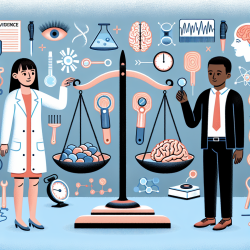Introduction
Depression is a significant health issue among youth worldwide, with nutrition emerging as a potential strategy to mitigate depressive symptoms. A recent systematic review titled "Associations between dietary intake, diet quality and depressive symptoms in youth" sheds light on the relationship between diet and mental health in children and adolescents. This blog explores how practitioners can leverage these findings to improve outcomes for young individuals.
The Link Between Diet and Depression
The review analyzed 32 studies and found consistent evidence that higher intakes of magnesium, vitamin B12, fiber, fruits, vegetables, and fish are inversely related to depressive symptoms in youth. However, evidence regarding other nutrients like vitamins B6, C, D, and E, iron, copper, zinc, omega-3 fatty acids, carbohydrates, and dietary fat was mixed. Notably, dietary effects were more pronounced in children than adolescents.
Implications for Practitioners
Practitioners working with children can use these findings to inform dietary recommendations and interventions. Here are some actionable steps:
- Incorporate Nutrition Assessments: Regularly evaluate dietary intake as part of comprehensive health assessments for children and adolescents.
- Promote Balanced Diets: Encourage diets rich in fruits, vegetables, and fish, which have shown a consistent inverse relationship with depressive symptoms.
- Educate Families: Provide resources and guidance to families on the importance of nutrition for mental health, emphasizing the role of specific nutrients.
- Collaborate with Dietitians: Work with nutrition experts to develop personalized dietary plans for children showing signs of depression.
Encouraging Further Research
While the review provides valuable insights, it also highlights the need for further research. Practitioners can contribute by:
- Participating in Studies: Engage in research efforts to explore the causal relationships between diet and mental health.
- Advocating for Comprehensive Studies: Support studies that adjust for confounding variables like sleep, socioeconomic status, and physical activity.
- Exploring New Avenues: Investigate the potential of probiotics and prebiotics in mental health interventions, given their emerging role in gut-brain interactions.
Conclusion
Understanding the impact of diet on mental health can empower practitioners to make informed, data-driven decisions that improve outcomes for children and adolescents. By integrating nutrition into mental health strategies, we can foster healthier, happier futures for young individuals.
To read the original research paper, please follow this link: Associations between dietary intake, diet quality and depressive symptoms in youth: A systematic review of observational studies.










